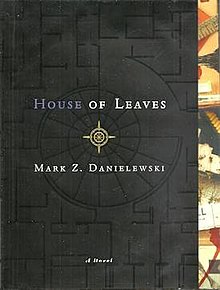Our website is made possible by displaying online advertisements to our visitors.
Please consider supporting us by disabling your ad blocker.
House of Leaves
 First-edition cover | |
| Author | Mark Z. Danielewski |
|---|---|
| Genre | |
| Publisher | Pantheon, Random House |
Publication date | March 7, 2000 |
| Publication place | United States |
| Media type | Print (paperback and hardcover) |
| Pages | 709 (paperback) |
| ISBN | 0-375-70376-4 |
| Followed by | The Whalestoe Letters |
House of Leaves is the debut novel by American author Mark Z. Danielewski, published in March 2000 by Pantheon Books. A bestseller, it has been translated into a number of languages, and is followed by a companion piece, The Whalestoe Letters.
The novel is written as a work of epistolary fiction and metafiction focusing on a fictional documentary film titled the Navidson Record, presented as a story within a story discussed in a handwritten monograph recovered by the primary narrator, Johnny Truant. The narrative makes heavy use of multiperspectivity as Truant's footnotes chronicle his efforts to transcribe the manuscript, which itself reveals the Navidson Record's supposed narrative through transcriptions and analysis depicting a story of a family who discovers a larger-on-the-inside labyrinth in their house.
House of Leaves maintains an academic publishing format throughout with exhibits, appendices, and an index, as well as numerous footnotes including citations for nonexistent works, interjections from the narrator, and notes from the editors to whom he supposedly sent the work for publication. It is also distinguished by convoluted page layouts: some pages contain only a few words or lines of text, arranged to mirror the events in the story, often creating both an agoraphobic and a claustrophobic effect. At points, the book must be rotated to be read, making it a prime example of ergodic literature.[1][2]
The book is most often described as a horror story, though the author has also endorsed readers' interpretation of it as a love story.[3] House of Leaves has also been described as an encyclopedic novel,[4] or conversely a satire of academia.[5]
- ^ Murphy, Cath (November 22, 2013). "Book Brawl: House of Leaves vs. Night Film". LitReactor. Archived from the original on May 9, 2016. Retrieved April 25, 2016.
- ^ Corrigan, Marianne; Ogden, Ash (2013). "Explorations in the Ergodic". Alluvium. 2 (2). doi:10.7766/alluvium.v2.2.01 (inactive November 1, 2024). Archived from the original on May 9, 2016. Retrieved April 25, 2016.
{{cite journal}}: CS1 maint: DOI inactive as of November 2024 (link) - ^ Danielewski expands on this point in an interview: "I had one woman come up to me in a bookstore and say, 'You know, everyone told me it was a horror book, but when I finished it, I realized that it was a love story.' And she's absolutely right. In some ways, genre is a marketing tool." Wittmershaus, Eric (May 6, 2000), "Profile: Mark Z. Danielewski", Flak Magazine, archived from the original on June 29, 2011, retrieved July 19, 2008.
- ^ Jason S. Polley. “Documenting the (Un)Official Kevin Carter Narrative: Encyclopedism, Irrealism, and Intimization in House of Leaves.” IAFOR Journal of Media, Communication & Film, vol. 5, no. 1, 2018, pp. 5–22, https://doi.org/10.22492/ijmcf.5.1.01.
- ^ Poole, Steven (July 15, 2000), "Gothic scholar", Guardian Unlimited, archived from the original on February 13, 2007, retrieved March 4, 2007.
Previous Page Next Page


